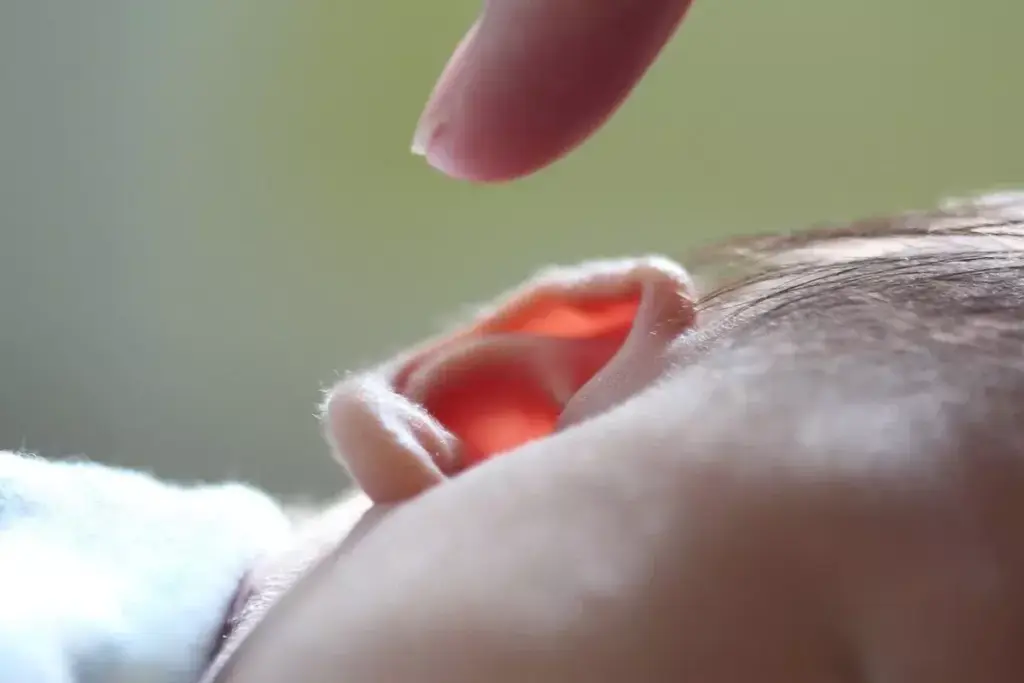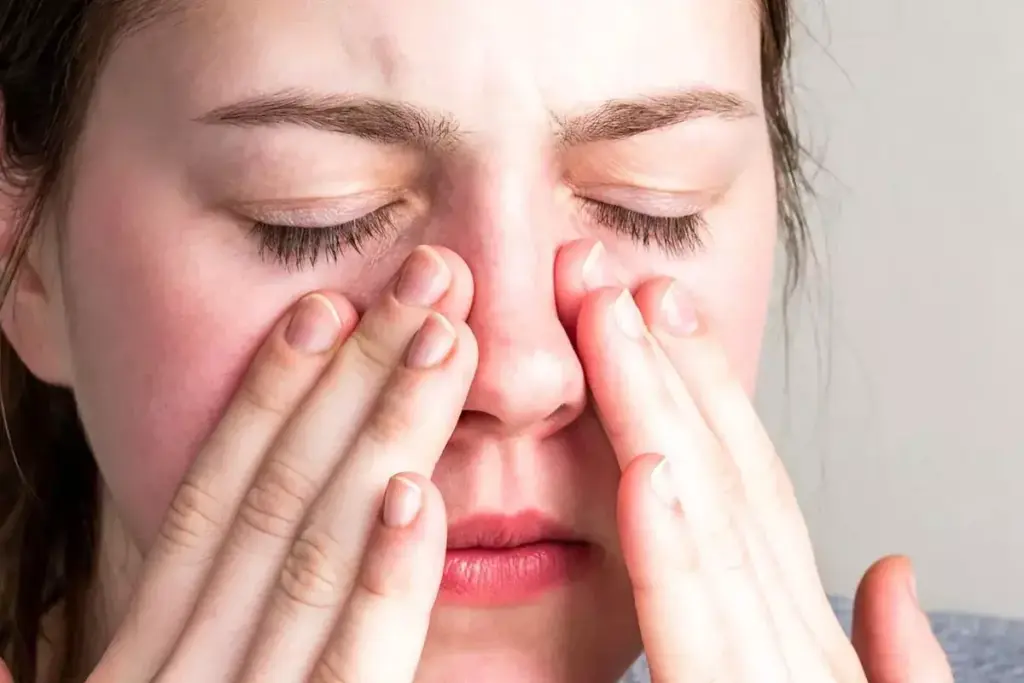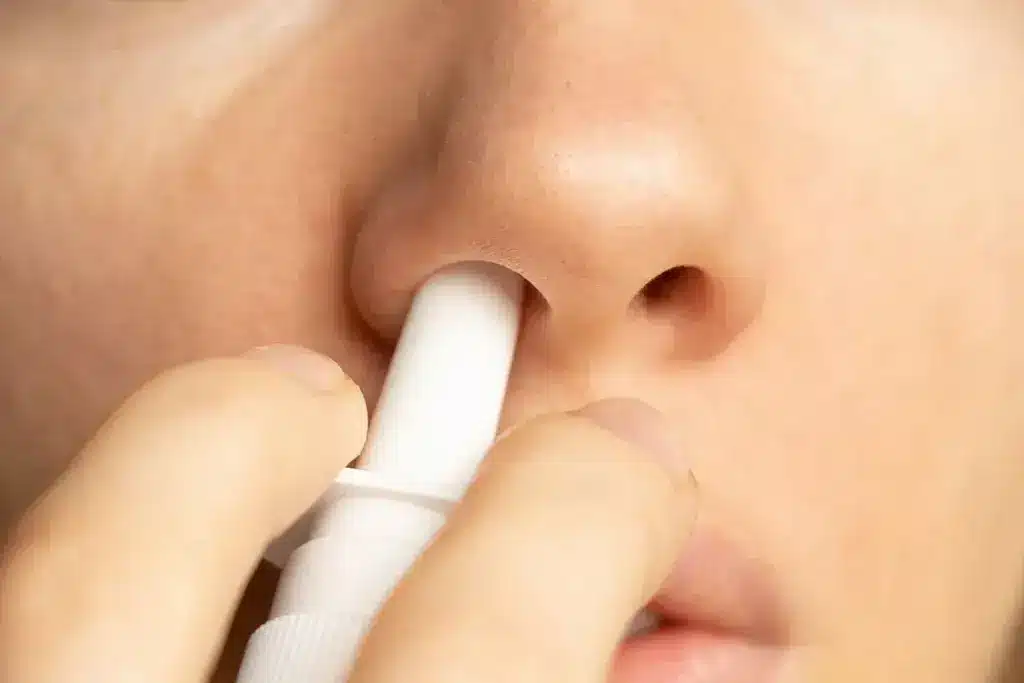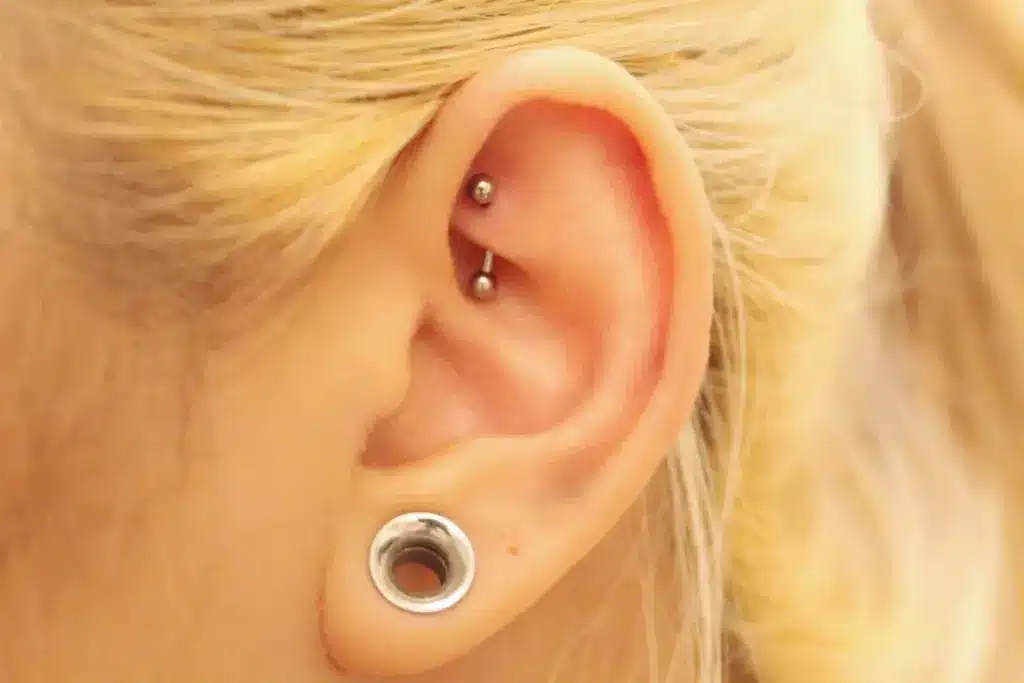
The link between depression and erectile dysfunction is a big worry for men’s health. It affects millions of people around the world.Can depression cause erectile dysfunction? Learn what research shows about the strong psychological and biological link between the two conditions.
Studies have found a bidirectional relationship between these two issues. Depression can make erectile dysfunction 39 percent more likely.
At Liv Hospital, we understand how these conditions are connected. We use a patient-focused, team-based method to meet our patients’ needs.
Key Takeaways
- The relationship between depression and erectile dysfunction is bidirectional.
- Depression increases the risk of erectile dysfunction by 39 percent.
- A thorough understanding of this complex relationship is key to effective treatment.
- Liv Hospital adopts a patient-centered approach to treating these interconnected conditions.
- A multidisciplinary treatment plan is essential for addressing the complex needs of patients.
The Connection Between Mental and Sexual Health

The link between mental health and sexual function is clear. Research shows how depression and erectile dysfunction are connected. It’s key to know how these issues affect men’s health.
Prevalence of Depression in the United States
Depression is a big problem in the U.S., hitting millions of adults. It’s one of the top mental health issues, affecting life quality and health. We need better mental health support and treatments.
Prevalence of Erectile Dysfunction in American Men
Erectile dysfunction is common among U.S. men. It’s more common as men get older. Many factors, like health issues and lifestyle, play a role.
Diabetes, for example, often goes hand in hand with ED, affecting 61.4% of patients. This shows ED is complex and needs a detailed approach to treat.
The Emerging Understanding of Their Relationship
Studies have shown a strong link between depression and ED. As we learn more, we see how these issues affect health together. This knowledge is vital for treating men’s health holistically.
This understanding stresses the need for a complete approach to men’s health. It’s about caring for both mental and sexual well-being.
Can Depression Cause Erectile Dysfunction? The Research Evidence
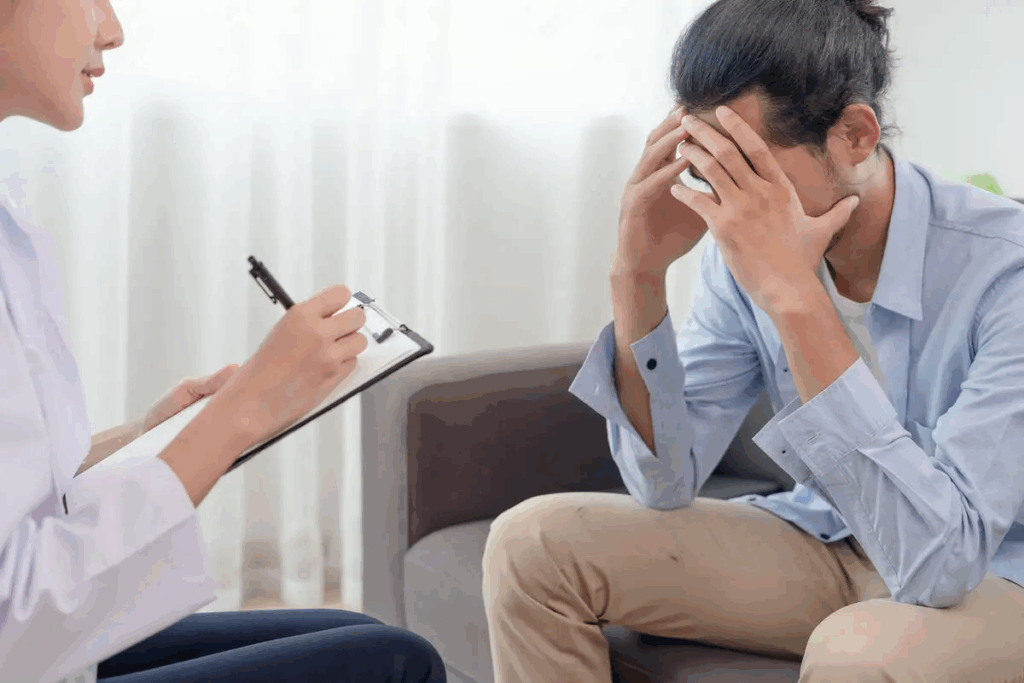
Research shows a link between depression and erectile dysfunction. We’ll look at the key findings that explain this connection.
Meta-Analysis Findings on Causality
In 2018, a meta-analysis shed light on depression and erectile dysfunction. It combined data from many studies to find patterns and connections.
Key findings from the meta-analysis showed men with depression face a higher risk of erectile dysfunction. The study found a clear link between the two conditions.
The 1.39x Increased Risk Factor
The 2018 meta-analysis found men with depression are 1.39 times more likely to have erectile dysfunction. This means a 39% higher risk, showing depression’s big impact on sexual health.
To show this, let’s look at a table:
Condition | Risk of ED |
Men without Depression | 1x |
Men with Depression | 1.39x |
Nocturnal Penile Tumescence Studies in Depressed Men
Nocturnal penile tumescence (NPT) studies also support the depression and erectile dysfunction link. NPT is when a man gets an erection while sleeping, usually in the REM stage.
Studies on NPT in depressed men found they often have fewer NPT events. This shows depression affects the body’s ability to get erections, not just the mind.
Looking at research from different angles helps us understand depression’s role in erectile dysfunction. This knowledge is key for treating both conditions effectively.
The Bidirectional Nature of Depression and ED
Depression and erectile dysfunction (ED) are linked in complex ways. They affect both our minds and bodies. This makes it hard for patients and doctors to tackle these issues together.
How Depression Affects Sexual Function
Depression can really mess with our sex lives. It can make us less interested in sex, harder to get excited, and unable to get an erection. The emotional pain of depression makes it tough to be close to others. Studies show that depression’s chemical changes can hurt our sex lives, showing we need a full treatment plan.
How Sexual Dysfunction Contributes to Depression
Sex problems, like ED, can make us feel bad about ourselves. This can lead to feelings of inadequacy, low self-worth, and frustration. These feelings can be very deep, affecting not just us but also our relationships.
The 2.92x Increased Risk of Depression in Men with ED
A 2022 study in the Journal of Sexual Medicine found something important. Men with ED are 2.92 times more likely to get depressed. This shows a strong connection between ED and depression. Men with ED are at a much higher risk of getting depressed, so doctors need to treat both together.
It’s key to understand how depression and ED affect each other. This knowledge helps doctors create better treatment plans. By seeing how these conditions interact, doctors can offer more help and support.
Groundbreaking 2024 Brazilian Research
In 2024, Brazilian researchers did a groundbreaking study. They looked at how depression and erectile dysfunction are linked in men. This study had over 21,000 men, giving us a deep look into this complex issue.
Study Design and Population Sample
The study was well-designed, with over 21,000 men. This big number helped the researchers understand the link between depression and erectile dysfunction. They used special tools to check for depression and erectile dysfunction in the men.
The study’s methods were strict. This made sure the results were true and could be applied to more people. With such a big group, the researchers could spot trends that smaller studies might miss.
Key Statistical Findings
The study found a clear link between depression and erectile dysfunction. It showed that erectile dysfunction is linked to depression. Men with erectile dysfunction were more likely to have depression.
The study found that men with erectile dysfunction were more likely to have depression. This shows how mental health and sexual function are connected.
“The findings of this study highlight the critical need for healthcare providers to consider both depression and erectile dysfunction when diagnosing and treating men with either condition.”
Clinical Implications for Treatment Approaches
The study’s results are important for doctors. It shows that treating depression and erectile dysfunction together might work better. This means that treating both conditions at the same time could lead to better results.
Using comprehensive care models that look at both mental health and sexual function could help. Doctors and mental health experts working together could create better treatment plans for each patient. This way, men with both depression and erectile dysfunction could see their quality of life improve.
Biological Mechanisms Linking Depression to Erectile Dysfunction
Studies have found several ways depression can lead to erectile dysfunction in men. These involve complex body processes that affect both our mood and sex life.
The Stress Hormone Cortisol and Vascular Constriction
Cortisol is a stress hormone our bodies release when we’re stressed or depressed. High levels of cortisol can narrow blood vessels. This makes it hard to get or keep an erection.
Neurotransmitter Imbalances Affecting Sexual Function
Depression messes with the brain’s chemicals, like serotonin and dopamine. These are important for sex. For example, some depression meds can lower sex drive and ability.
Hormonal Changes in Depression
Depression can also change our hormones, affecting sex health. Men with depression might have less testosterone. This hormone is key for sex drive and function.
The table below shows how depression can lead to erectile dysfunction:
Biological Mechanism | Description | Impact on Erectile Function |
Cortisol and Vascular Constriction | Elevated cortisol reduces blood flow | Difficulty achieving or maintaining an erection |
Neurotransmitter Imbalances | Disrupts serotonin, dopamine, and norepinephrine balance | Affects sexual desire and function |
Hormonal Changes | Lower testosterone levels | Reduced libido and erectile dysfunction |
Knowing these mechanisms helps us find better treatments for both depression and erectile dysfunction.
Psychological Pathways from Depression to ED
Depression can really affect a person’s sex life, causing erectile dysfunction (ED). The mind plays a big role in this, mixing mental health with sexual function.
Performance Anxiety and Sexual Confidence
Performance anxiety is a big factor in depression leading to ED. Feeling not good enough or worried about sex can start a cycle. This worry can hurt sexual confidence, making it hard to get or keep an erection.
Reduced Sexual Desire and Libido
Depression often lowers libido or sex drive. Feeling down can make people lose interest in things they used to love, including sex. This drop in libido can make it hard to get an erection.
Negative Thought Patterns Affecting Arousal
Depression brings negative thought patterns that mess with getting sexually excited. These thoughts can pull focus away from sex, making it tough to get an erection. Also, constant negative thinking can make it hard to respond to sexual signals, adding to ED.
Relationship Strain and Communication Issues
Depression can also hurt relationships, causing tension and communication problems that might lead to ED. When one partner is depressed, it can make the relationship feel strained or disconnected. This stress can show up as ED, making sex harder because of relationship issues.
In summary, depression leading to ED involves many factors like performance anxiety, low libido, negative thoughts, and relationship problems. Understanding these connections is key to finding effective treatments for ED.
Genetic Research Supporting the Depression-ED Link
Genetic research has shed light on the connection between depression and erectile dysfunction. Studies have found genetic markers common to both, hinting at a shared genetic cause.
Shared Genetic Markers Between Conditions
Research has uncovered genetic variants linked to both depression and erectile dysfunction. Genes that control neurotransmitters like serotonin and dopamine are involved. This indicates a genetic link between depression and ED.
Evidence for Causal Genetic Relationships
Studies have looked into how depression and ED are genetically connected. Techniques like Mendelian randomization show that depression’s genes can lead to ED. This suggests depression can cause ED.
Future Directions in Genetic Research
While promising, more research is needed to understand the depression-ED genetic link. Future studies should aim to find specific genetic markers. They should also explore how these markers interact with the environment.
By deepening our knowledge of depression and ED’s genetics, we can create better treatments. This will help those dealing with both conditions.
Antidepressant Medications and Their Impact on Sexual Function
Antidepressants help manage depression but can affect sexual health. This is a big concern for doctors and patients.
SSRIs and Sexual Side Effects
SSRIs are common antidepressants but can cause sexual problems. These include low libido, erectile dysfunction, and delayed orgasm. The increase in serotonin levels is thought to be the reason.
SSRIs can affect people differently. Some may feel less sexual desire, while others may struggle to orgasm. This shows the need for tailored treatments.
SNRIs and Their Sexual Impact Profile
SNRIs also impact sexual function. They increase serotonin and norepinephrine levels. Though they have different side effects than SSRIs, they can also cause sexual problems.
SNRIs might have fewer sexual side effects than SSRIs, but the difference is small. The impact of SNRIs on sex can vary based on the medication and the person.
Antidepressants with Fewer Sexual Side Effects
Not all antidepressants cause the same sexual problems. Bupropion and mirtazapine have fewer side effects. Bupropion, in particular, is sometimes used to reduce SSRI side effects.
It’s important to talk about sexual side effects with patients. This way, we can find treatments that manage depression without harming sex life.
Managing Medication-Induced Sexual Dysfunction
Dealing with sexual problems from antidepressants needs a detailed plan. Doctors might switch to a different antidepressant or adjust the dose. This can help reduce side effects.
Adding other treatments can also help. For example, bupropion or phosphodiesterase-5 inhibitors for erectile dysfunction. Talking openly about sexual health is key to managing these issues.
Understanding how antidepressants affect sex and finding ways to lessen these effects is important. This way, we can care for patients’ mental and sexual health better.
Diagnosing Depression-Related Erectile Dysfunction
To accurately diagnose erectile dysfunction related to depression, healthcare providers must use a detailed approach. They need to understand how depression and erectile dysfunction interact.
Differential Diagnosis Approaches
Differential diagnosis is key to figuring out if erectile dysfunction is mainly due to depression. A thorough check helps separate the psychological from the physical causes.
Physical vs. Psychological ED Assessment
Checking erectile dysfunction involves looking at both physical and mental factors. Physical assessments might include tests for vascular diseases or hormonal issues. Mental health checks focus on conditions like depression.
Screening Tools for Depression in Men with ED
There are tools to spot depression in men with erectile dysfunction. The Patient Health Questionnaire-9 (PHQ-9) and the Beck Depression Inventory (BDI) are examples. Early detection of depression is key for good treatment.
The Importance of Comprehensive Evaluation
A detailed evaluation is essential for diagnosing depression-related erectile dysfunction. It makes sure all possible causes are looked at, leading to better treatment plans. We must look at both physical and mental sides for complete care.
Diagnostic Approach | Description | Key Components |
Differential Diagnosis | Identifying primary cause of ED | Medical history, psychological evaluation |
Physical Assessment | Evaluating physical causes of ED | Vascular check, hormonal level assessment |
Psychological Evaluation | Assessing mental health factors | Depression screening tools, anxiety assessment |
Effective Treatment Strategies for Depression-Induced ED
Depression and erectile dysfunction are linked in a complex way. Treating both conditions together is key. This approach helps manage both mental health and sexual issues.
Psychotherapy Approaches
Psychotherapy is vital for treating depression-induced ED. Cognitive-behavioral therapy (CBT) is very helpful. It helps change negative thoughts that affect both depression and ED.
CBT improves mood and reduces anxiety. It also boosts sexual function. Other therapies like interpersonal therapy (IPT) and psychodynamic therapy can also help. IPT works on improving relationships, while psychodynamic therapy digs into the causes of depression and ED.
Medication Management Strategies
Managing medications is important in treating depression-induced ED. SSRIs are often used for depression but can make ED worse. In such cases, switching to another antidepressant or adding a specific ED medication might be needed.
Medicines like sildenafil (Viagra) or tadalafil (Cialis) can help with ED. They increase blood flow to the penis. But, it’s important to manage these medications carefully because they can interact with other drugs.
Medication Class | Examples | Effect on ED |
SSRIs | Fluoxetine, Sertraline | Can worsen ED in some cases |
PDE5 Inhibitors | Sildenafil, Tadalafil | Can improve ED |
Tricyclic Antidepressants | Amitriptyline | Can worsen ED |
Lifestyle Modifications That Improve Both Conditions
Changing your lifestyle can help with both depression and ED. Regular exercise boosts mood and sexual function. Eating a healthy diet also supports overall well-being.
Stress management, like meditation or yoga, can reduce anxiety and improve sleep. This is good for both mental health and sexual function. Avoiding alcohol and quitting smoking can also help.
By making these lifestyle changes, you can see improvements in both mental health and sexual function. It’s important to work with healthcare providers to find the right treatment plan for you.
The Benefits of Integrated Treatment Approaches
Treating depression and ED together needs a mix of mental health and urology care. It’s key to tackle both conditions fully to see better results.
Collaborative Care Between Mental Health and Urology
It’s important for mental health experts and urologists to work together. They can better understand the patient’s situation and make a treatment plan that fits.
This team effort helps in many ways:
- It leads to more accurate diagnosis and treatment of the root causes.
- It helps manage medication side effects better.
- It offers more support and education to the patient.
Patient-Centered Treatment Planning
Planning treatment with the patient’s needs in mind is essential. This means:
- Looking at the patient’s health and medical history.
- Understanding what the patient wants and hopes for.
- Creating a treatment plan that tackles both depression and ED.
Long-Term Management Strategies
Managing depression and ED long-term needs ongoing care. Strategies include:
- Regular check-ups with healthcare providers.
- Keeping an eye on how well the treatment is working and any side effects.
- Making lifestyle changes to help mental and sexual health.
Success Rates of Combined Treatments
Studies show that treating depression and ED together can really help. A study found that men who got this kind of treatment saw a big drop in depressive symptoms and better erectile function.
Treatment Approach | Improvement in Depressive Symptoms | Improvement in Erectile Function |
Integrated Treatment | 62% | 55% |
Standard Treatment | 40% | 30% |
The table shows that integrated treatments lead to better results for both depression and ED than standard treatments.
Conclusion
It’s important to understand how depression and erectile dysfunction are connected. Research shows that depression can lead to erectile dysfunction, and erectile dysfunction can make depression worse. This means we need to treat both conditions together.
Managing depression and erectile dysfunction requires a complete approach. We need to look at both the physical and mental sides of these issues. Working together, mental health experts and urologists can create better treatment plans for patients.
Studies have found that depression can cause erectile dysfunction. This shows we need a team effort to diagnose and treat these problems. By knowing more about depression and erectile dysfunction, doctors can help their patients better.
FAQ
Can depression cause erectile dysfunction?
Yes, depression can lead to erectile dysfunction. Studies have found a strong link between the two. Depression might make erectile dysfunction worse or even cause it in some men.
How common is erectile dysfunction in men with depression?
Men with depression are more likely to have erectile dysfunction. A study found that depression raises the risk by 1.39 times.
Can antidepressants cause erectile dysfunction?
Some antidepressants, like SSRIs, can cause erectile dysfunction. But not all antidepressants have the same effect. Some might have fewer sexual side effects.
How does depression affect sexual function?
Depression can lower libido and cause performance anxiety. It can also lead to negative thoughts that affect arousal and erectile function.
What are the treatment options for depression-induced erectile dysfunction?
Treatment often includes psychotherapy, medication, and lifestyle changes. Approaches that tackle both depression and erectile dysfunction can improve outcomes.
Can lifestyle changes help alleviate depression and erectile dysfunction?
Yes, changes like regular exercise and a balanced diet can help. Stress management and better sleep habits also play a role.
Is there a genetic link between depression and erectile dysfunction?
Research suggests a genetic link between depression and erectile dysfunction. This indicates a possible genetic factor in their connection.
How is depression-related erectile dysfunction diagnosed?
Diagnosis involves a thorough evaluation. This includes physical and psychological assessments and depression screening tools.
What are the benefits of integrated treatment for depression and erectile dysfunction?
Integrated treatment can improve symptoms and quality of life. It leads to better management of both conditions and higher treatment satisfaction.
Can depression cause impotence?
Yes, depression can lead to impotence. The emotional and psychological aspects of depression can affect a man’s ability to get or keep an erection.
Does depression cause erectile dysfunction?
Depression can contribute to erectile dysfunction. The relationship is complex, but research shows depression increases the risk of erectile dysfunction.
References
- Moore, C. L., & Daniels, B. (2014). Accuracy of reduced-dose computed tomography for ureteral stones in emergency department patients. Annals of Emergency Medicine, 64(2), 189–198. https://pmc.ncbi.nlm.nih.gov/articles/PMC5131573/



